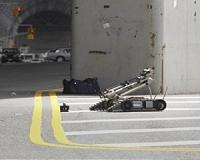 |
Paris (AFP) April 24, 2011 Nuclear radiation is frightening stuff. A quarter century after Chernobyl, and more than 65 years after atomic bombs laid waste to Hiroshima and Nagasaki, fatally sickening thousands not killed outright, even unfounded fear of radioactive contamination can spark panic. The explosions at the Fukushima nuclear plant following the March 11 earthquake and tsunami that devastated a large swath of Japan emptied pharmacies in North America and Europe of anti-radiation pills despite reassurances from all manner of experts that the danger was nil. There are any number of agents -- cancer, AIDS and auto accidents, to name three -- that claim millions of victims every year but do not inspire that same kind of terror. People still smoke, practise unsafe sex and climb into their cars every day. So why is nuclear radiation so fearsome, and what determines how we react when faced with a threat, imagined or real? The answer is complex and laced with contradictions, starting with the fact that most people don't even think twice about absorbing radiation doses delivered through medical X-rays or scans. But put the words "nuclear" and "accident" together, and suddenly the idea that sub-atomic particles can slip through our skin to damage inner tissue, and even alter the very fabric of our DNA, sets spines to shuddering. "Anything that can penetrate inside our bodies fills us with apprehension, and triggers an ancestral, or ancient, fear," said Herve Chneiweiss, a neurologist at the Centre for Psychiatry and Neuroscience at Universite Paris Descartes. And when the culprit is invisible, odorless, tasteless -- beyond, in other words, the reach of perception -- that angst is magnified even more. "We are all fearful of invisible things that have invisible effects. Even the word itself almost invokes fear as soon as it is pronounced," said Etienne Klein, a physicist at the French atomic energy commission and a professor of philosophy at the Ecole Centrale de Paris. For evolutionary psychologists, who argue that human behaviour is deeply rooted in natural selection and the need to adapt to our environment, fear of radiation also taps into the apprehension of our distant forbear about contagious disease. Even if early man could not see virus or bacteria, he was confronted with their lethal impact. "People treat nuclear contamination as if it were disease contamination -- emotionally, they think about mere exposure and not dose," said John Tooby, a professor at the University of California at Santa Barbara who has written extensively on the evolutionary origins of emotion. "Although we live bathed in a sea of background radiation, people treat any increment as a dire risk," he said by email. "Radiation increments from Fukushima create incipient panics here, even though it is orders of magnitude less than they might have experienced by moving to higher altitude," he added. Tooby recalled, while still a student, using a Geiger counter to show a custodian that his household Chinaware was more radioactive than other objects nearby. "His wife insisted on throwing it all out, even though I told them it was harmless," he recalled. Such gut-level reactions, these and other experts say, are overlaid with historical knowledge that remind us of both the atom's terrible power and the unpredictable conditions under which it can be unleashed. The explosion on April 26, 1986 of Chernobyl's No. 4 reactor in Ukraine spewed radioactive dust and ash over more than 200,000 square kilometers (77,000 square miles), reaching as far north as Scotland and as far west as Ireland. A much smaller area around the site suffered serious consequences, as did some of the hundreds of thousands of "liquidators" conscripted by the Soviet regime then in power to staunch the nuclear fire and clean up the deadly mess. The health and death tolls from Chernobyl -- and the areas affected -- are still fiercely disputed, and estimates vary hugely. That very uncertainty further fuels alarm, experts say. "How was one [living in France] supposed to know whether or not to worry about a radioactive cloud?" asked Francois Taddei, a molecular geneticist at the French National Institute of Health and Medical Research (INSERM). "For Chernobyl, we were told that there was nothing, which in fact there was. How does one rebuild confidence?" "One had the impression -- justified or not -- that the authorities were lying, and so everything they said was cast into doubt," said Klein.
Share This Article With Planet Earth
Related Links Space Technology News - Applications and Research
 Robot readings in Japan nuke plant 'harsh'
Robot readings in Japan nuke plant 'harsh'Tokyo (UPI) Apr 18, 2011 Remote-control robots at the quake-damaged Fukushima nuclear plant in Japan have measured a "harsh environment" for humans to work in, officials said. The measurements, which will complicate efforts to stabilize the damaged reactors, came a day after the company operating the Fukushima Daiichi plant said it would take until the end of the year to bring the crisis under control, the BBC ... read more |
|
| The content herein, unless otherwise known to be public domain, are Copyright 1995-2010 - SpaceDaily. AFP and UPI Wire Stories are copyright Agence France-Presse and United Press International. ESA Portal Reports are copyright European Space Agency. All NASA sourced material is public domain. Additional copyrights may apply in whole or part to other bona fide parties. Advertising does not imply endorsement,agreement or approval of any opinions, statements or information provided by SpaceDaily on any Web page published or hosted by SpaceDaily. Privacy Statement |